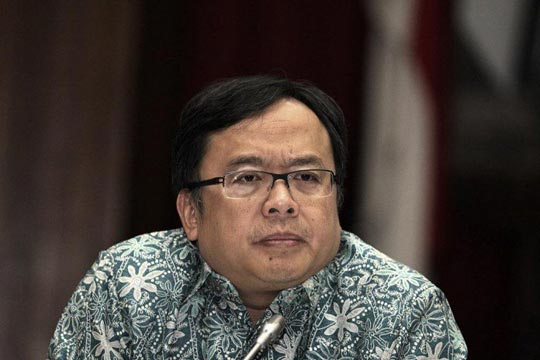Jakarta, 03 Rajab 1437/10 April 2016 (MINA) – Due to weaker-than-expected revenue in 2016, the government of Indonesia has to cut government spending by IDR 50.6 trillion (approx. USD $3.8 billion) this year.
Indonesian Finance Minister Bambang Brodjonegoro informed that the government is currently in the middle of discussing revisions of the 2016 State Budget (APBN 2016), Mi’raj Islamic New Agency (MINA) quoted indonesia-investments.com as reporting.
Weaker-than-expected government revenue is primarily the cause of weaker-than-targeted tax revenue. The government will also revise its inflation, average rupiah rate, and average oil price targets. Despite the expected cut
Due to an expected decline in income tax revenue and non-tax revenue collection in the oil and gas sector, the government needs to curtail spending in order to safeguard prudent fiscal management.
Also Read: Indonesia-Oman Agree on Visa Waiver for Diplomatic, Service, and Special Passports
Finance Minister Brodjonegoro said there could be IDR 67.6 trillion (approx. USD $5.1 billion) in missed tax revenue this year.
Meanwhile, the average Indonesian crude oil price is to be lowered from USD $50 per barrel to USD $35 per barrel due to sluggish global crude oil prices. As a consequence, the nation’s budget deficit is expected to widen from an initial 2.15 percent to 2.5 percent of gross domestic product (GDP), still below the legislated budget deficit cap of 3 percent of GDP.
Apart from curtailed tax income in the oil and gas sector, Brodjonegoro also expects lower state income in non-tax revenue in the non-oil and gas sector up to IDR 25 trillion (approx. USD $1.9 billion).
Moreover, yesterday it was reported that Indonesia plans to raise non-taxable income by 50 percent from IDR 36 million (approx. USD $2,727) to IDR 54 million (approx. USD $4,090) in a bid to strengthen people’s purchasing power and encourage household consumption.
Also Read: Indonesian Navy Prepares Three Hospital Ships for Humanitarian Mission in Gaza
This move should lead to lower tax revenue from personal income tax collection but due to rising household consumption and investment it is expected to lead to higher value-added tax (VAT) and corporate income tax revenue.
Minister Brodjonegoro also emphasizes the importance of the passing of the tax amnesty bill (which still requires deliberation in parliament). Through this bill the government expects to receive an additional IDR 60 trillion (approx. USD $4.5) in tax revenue.
As such, the government plans to cut its spending target by IDR 50.6 trillion in the 2016 Revised State Budget. Brodjonegoro added that spending will be mostly cut on those activities and projects that are not highly necessary and bring no or few structural benefits to the economy (for example state travels, advertisement spending, and government
office renovations. However, spending on social welfare projects will also be cut slightly.
Revised budget, inflation and forex rate
Also Read: Floods Spread in North Aceh, Eight Districts Submerged
Meanwhile, the government will also propose to revise its inflation and rupiah exchange rate targets in the 2016 Revised State Budget.
The nation’s inflation target is expected to be cut from 4.7 percent (y/y) to 4 percent (y/y), while the rupiah is expected to be stronger than initially assumed. The government will propose to cut the average rupiah rate from IDR 13,900 per US dollar to IDR 13,400 per US dollar. On 17 May 2016 the government’s proposals will be discussed in Parliament.
The Indonesian government will leave its GDP growth assumption in the 2016 State Budget unchanged at 5.3 percent (y/y). We believe still target is slightly too ambitious as household consumption, the main pillar of economic growth in Indonesia (accounting for about 56 percent of overall GDP growth) remained subdued so far this year. Indonesia’s tax revenue collection stood at IDR 194 trillion (approx. USD $14.7 billion) in the first quarter of 2016, down 2.1 percent from tax revenue realization in the same period one year earlier.
This weak result was caused by lower tax revenue from value-added taxes (VATs) which is primarily due to people’s curbed consumption amid sluggish economic growth and the uncertain context.
Also Read: Chinese Investment in Central Java Surges; Fujian Proposes Direct Semarang–Fuzhou Flight
Sluggish household consumption impacts negatively on business expansion and therefore a 5.3 percentage point GDP growth pace is considered too ambitious. The higher non-taxable income will not be enough to boost household consumption significantly amid ongoing economic uncertainty (for example Indonesia’s consumer confidence index declined in March on concerns of soaring prices ahead of the Ramadan and Idul Fitri celebrations).
Therefore the key to boost economic growth in Indonesia remains government spending (for example on infrastructure development hence causing a multiplier effect).
The proposed IDR 50.6 cut in government spending is not so much a concern. More troubling is that it can take up to June before the revised state budget is approved. This can cause a delay in government spending (just like we saw last year). (T/R07/R01)
Mi’raj Islamic New Agency (MINA)
Also Read: Umar ibn Al-Khattab’s Speech Before Entering Jerusalem Highlighted at AWG Commemoration

































 Mina Indonesia
Mina Indonesia Mina Arabic
Mina Arabic